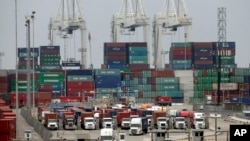U.S. economic growth slowed sharply in the first three months of this year.
Wednesday's report from the Commerce Department says the gross domestic product expanded at an annual rate of just two-tenths of a percent.
That is much slower than the 2.2 percent rate of the last quarter of 2014. The GDP is the sum of all goods and services produced in a nation and the broadest gauge of economic health.
Economists blame the slowdown on unusually foul winter weather and a strike that stopped shipping in the usually busy U.S. West Coast ports.
Before the latest GDP report, the National Association for Business Economics, surveyed key economists at companies across the United States and found expectations for “solid economic growth” remain intact in spite of recent “disappointing” economic data. Spokesman Ken Simonson said growth will probably resume because weather and labor problems have been resolved.
The relatively high value of the U.S. dollar also hurt the GDP because it weakened American exports and boosted imports. An expensive dollar means U.S.-made exports are more expensive on global markets, while imports are more attractive to American buyers. White House economic advisor Jason Furman says “tepid” foreign demand hurt U.S. exports and overall growth. He also said sharply falling oil prices have hurt investment in energy facilities, further crimping growth.
Furman says U.S. consumers are saving rather than spending the money they are no longer spending on gasoline. He says savings from lower energy costs could be a source of consumer spending and growth in the future.
Fed keeps interest rate low
Meanwhile, the U.S. Federal Reserve said that its top officials have voted to keep the key interest rate steady at the record low level where it has been since the financial crisis in 2008.
In a policy statement, Fed officials wrote that keeping the interest rate low will help the economy resume "moderate" growth. They said officials will watch for further improvements in the job market and slightly higher inflation before they raise rates.
PNC Bank Senior Economist Gus Faucher says some recent economic problems are temporary and the economy will be “better through the rest of 2015.” In a Skype interview, he said that will make the Fed “comfortable” raising short-term interest rates some time later this year.
During the recession, the Fed cut interest rates nearly to zero in hopes of bolstering recovery. When record low interest rates failed to spark economic growth, the Fed developed tools that had never been used before in the U.S. economy by implementing several massive bond-buying programs to push rates down.
Eight years after the financial crisis, unemployment has fallen from a recession high of 10 percent in 2009 to 5.5 percent now. The stock market recovered its losses and has been hitting new record highs.
Inflation remains below the 2 percent rate that Fed experts say would be healthy for the economy.





